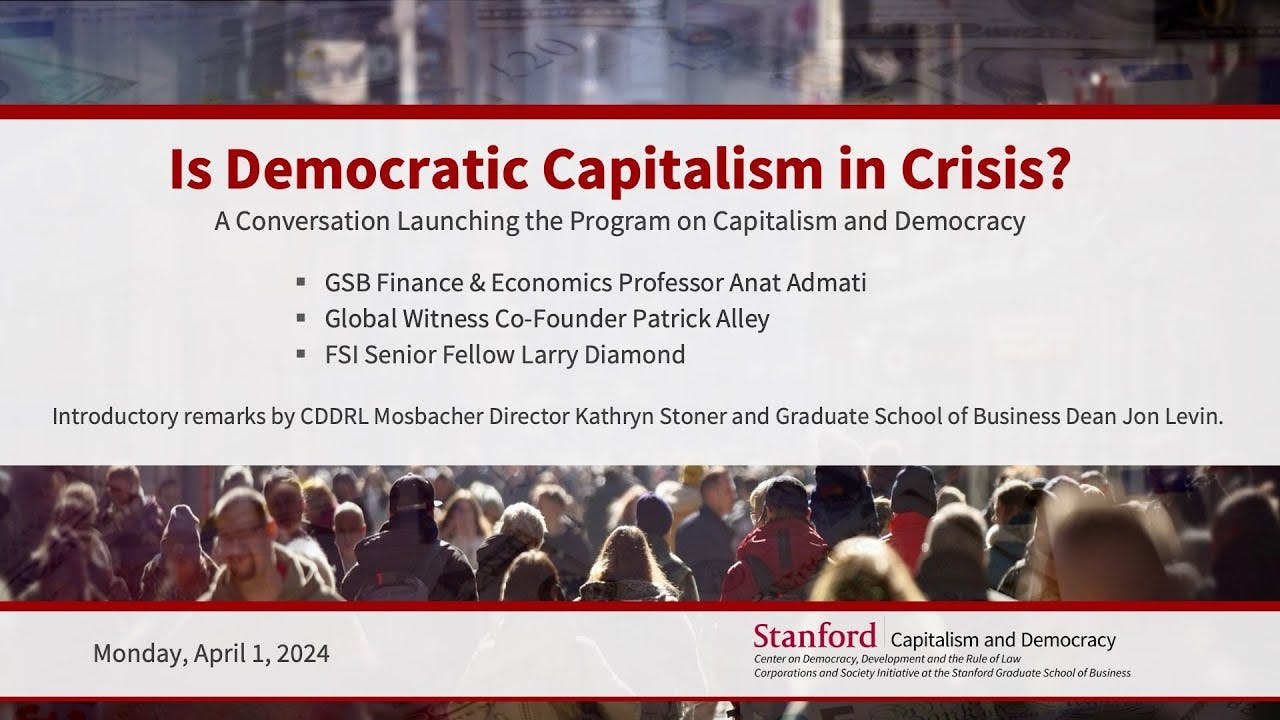Is Democratic Capitalism in Crisis?
()

The Stanford Capitalism and Democracy Initiative
- The Stanford Capitalism and Democracy Initiative is a new collaboration between the Stanford Business School and the Freeman Spogli Institute.
- The initiative will explore the complex interactions between democratic institutions, markets, and private sector participants.
- The initiative's intellectual foundation is based on the work of Anat Admati, a professor at the Stanford Graduate School of Business.
- The initiative will be centered at the intersection of business decision-making, policymaking, and the foundations of democratic institutions.
Global Witness and Corruption
- Global Witness was founded in the early 1990s by Patrick Alley and two friends to investigate the connection between illegal timber trade and the funding of the civil war in Cambodia.
- Through pressure from the US government, the Thai-Cambodia border was closed, leading to the financial downfall of the Karu rebel group.
- Their investigation uncovered leaked documents revealing collaboration between the Cambodian Prime Minister and the Khmer Rouge, highlighting the issue of corruption.
- Global Witness evolved into a world-class organization with a significant impact in exposing corruption and promoting transparency.
Enablers of Corruption
- Corruption is a globalized industry involving enablers in various countries.
- Enablers include criminals, corporations, the financial system, accounting firms, PR companies, and others who facilitate questionable activities.
- The "Pinstripe Army" refers to a network of enablers who distort truth, confuse the public and policymakers, and contribute to the erosion of democracy.
- The speaker criticizes enablers who produce flawed analyses or narratives that favor certain interests.
The Relationship Between Capitalism, Democracy, and Corruption
- The discussion revolves around the relationship between capitalism, democracy, and corruption.
- Corruption is seen as a significant issue that can undermine both capitalism and democracy, leading to negative consequences for the public.
- The example of Nigeria is given to illustrate how corruption can lead to autocracy and poverty.
- The role of the state in regulating capitalism and preventing corruption is emphasized.
- The discussion also touches upon successful cases of regulation, such as tobacco regulation in the United States.
- The importance of a competent and willing state in implementing necessary regulations is highlighted.
- The speaker emphasizes the need for democracy to function effectively in order to achieve a desired financial system.
- The alarming increase in the number of environmental activists killed annually is mentioned, underscoring the human cost of corruption.
- The discussion acknowledges the need to differentiate between various types of corruption, particularly from a global south perspective.
- The private sector is recognized as an engine of growth and innovation, but the speaker criticizes "financialized capitalism" or "predatory capitalism" for undermining democracy.
- The speaker argues against socialism, stating that real-world examples of socialism have been disastrous for political freedom and individual rights.
- The speaker emphasizes the importance of individual enterprise and initiative conducted transparently and with concern for the community, while criticizing predatory capitalism that undermines fairness, human well-being, and democracy.